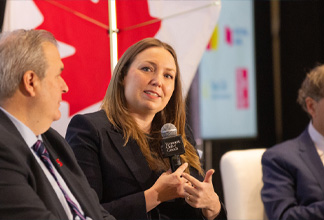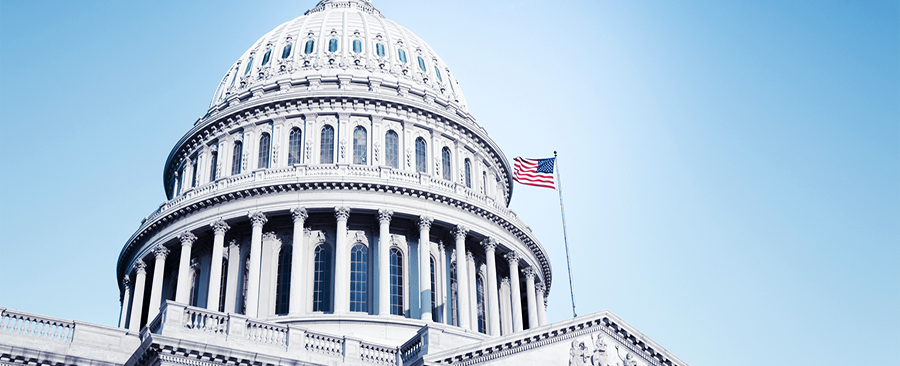U.S. Midterms Are Over: What Does That Mean for Canada?
Written by The Content Team
Published on November 9, 2018
minute read
Share:
After months of campaigning, hand-wringing and political uncertainty, the midterm elections in the U.S. are now over. The Democrats regained control of the House of Representatives and the Republicans held onto, even grew slightly, their majority in the Senate. Now that it's over and Washington returns to governing full-time, what do the changes mean for Canada?
What Has Changed?
Midterm elections tend to be tough for a sitting president. It's a referendum of sorts on the job done at the half-term mark — and weakness at this juncture is not unusual. However, this was a particularly contentious midterm season, resulting in the Democratic Party taking back the majority vote in the House.
But, with the Senate still under Republican control and President Donald Trump in the White House, will the new-found House majority change much? Eric Lascelles, Chief Economist for RBC Global Asset Management, says things will likely be different, but not in a dramatic way for Canada.
"We see three key fiscal policy themes over the next two years," he says, now that the U.S. is governed by a divided Congress.
Legislative Paralysis
Since Trump was elected President in 2016, the Republican Party has controlled the House and the Senate, giving them the ability to push legislation through — although not without complications. After the midterms, passing legislation will likely become tougher for both sides of the aisle. That's the nature of a system with checks and balances.
"This represents the biggest prospective change versus the last two years," says Lascelles.
Some items on the Republican legislative agenda that may be slowed or halted by the Congressional shift:
- Immigration reform
- Healthcare reform
- Infrastructure bill
Bigger Battles
After more than a year of tough negotiations, Canada, Mexico and the U.S. recently reached a deal to replace the North American Free Trade Agreement (NAFTA) with the new United States-Mexico-Canada Agreement (USMCA). The new agreement still requires the approval of Congress. "We believe the deal will ultimately pass," says Lascelles. "But with an 85% likelihood, that means the risk of failure is not zero."
U.S. tariffs on Canadian steel and aluminum remain a sticking point. Canadian Prime Minister Justin Trudeau wants the tariffs removed, but hasn't signalled he won't ratify the trade deal if they are not. "We would much rather have genuine free trade with the United States so we're gonna continue to work, as soon as we can, to lift those tariffs," Trudeau told CNN in a televised interview after the midterm elections.
Nathan Janzen, a senior economist with RBC Economics, says that ultimately none of the three trade partners wants to reopen the messy debate that increased uncertainty for business, causing less investment overall. "Of course, the agreement also needs to be ratified by Canada and Mexico, but we continue to think the most likely outcome is that the deal will move forward," says Janzen.
Executive Powers
President Trump's ability to use executive orders remains a vital part of the system. This is on the list of policy themes because many things can be enacted by executive orders, regardless of who controls Congress, Lascelles points out.
Policy areas that could be affected by executive orders:
- Trade tariffs
- Foreign policy
- Changes to pre-existing law
For Investors to Consider
Historically, Lascelles notes, the U.S. stock market is often weak in the months leading up to midterm elections. This was the case this year as well. Similarly, markets tend to be weakest in year two of the four-year Presidential cycle, which is currently underway. "Technical analysis gives us no guarantees about future performance," cautions Lascelles.
But it's certainly interesting to observe, take note of the changes and review potential outcomes.
RBC Direct Investing Inc., RBC Global Asset Management Inc. and Royal Bank of Canada are separate corporate entities which are affiliated. RBC Direct Investing Inc. is a wholly owned subsidiary of Royal Bank of Canada and is a Member of the Investment Industry Regulatory Organization of Canada and the Canadian Investor Protection Fund. Royal Bank of Canada and certain of its issuers are related to RBC Direct Investing Inc. RBC Direct Investing Inc. does not provide investment advice or recommendations regarding the purchase or sale of any securities. Investors are responsible for their own investment decisions. RBC Direct Investing is a business name used by RBC Direct Investing Inc. ® / ™ Trademark(s) of Royal Bank of Canada. RBC and Royal Bank are registered trademarks of Royal Bank of Canada. Used under licence. © Royal Bank of Canada 2018. All rights reserved.
The views and opinions expressed in this publication are for your general interest and do not necessarily reflect the views and opinions of RBC Direct Investing. Furthermore, the products, services and securities referred to in this publication are only available in Canada and other jurisdictions where they may be legally offered for sale. If you are not currently resident of Canada, you should not access the information available on the RBC Direct Investing website.
Explore More

7 Ways to Get Ahead Financially in 2026
How you might invigorate your finances and put your money to work more intentionally this year
minute read

Economic Outlook: Uncertainty is Here to Stay, So What's Next?
Takeaways from the Economic Club of Canada’s Annual Event
minute read

3 things: Week of December 15
What the Inspired Investor team is watching this week
minute read
Inspired Investor brings you personal stories, timely information and expert insights to empower your investment decisions. Visit About Us to find out more.







